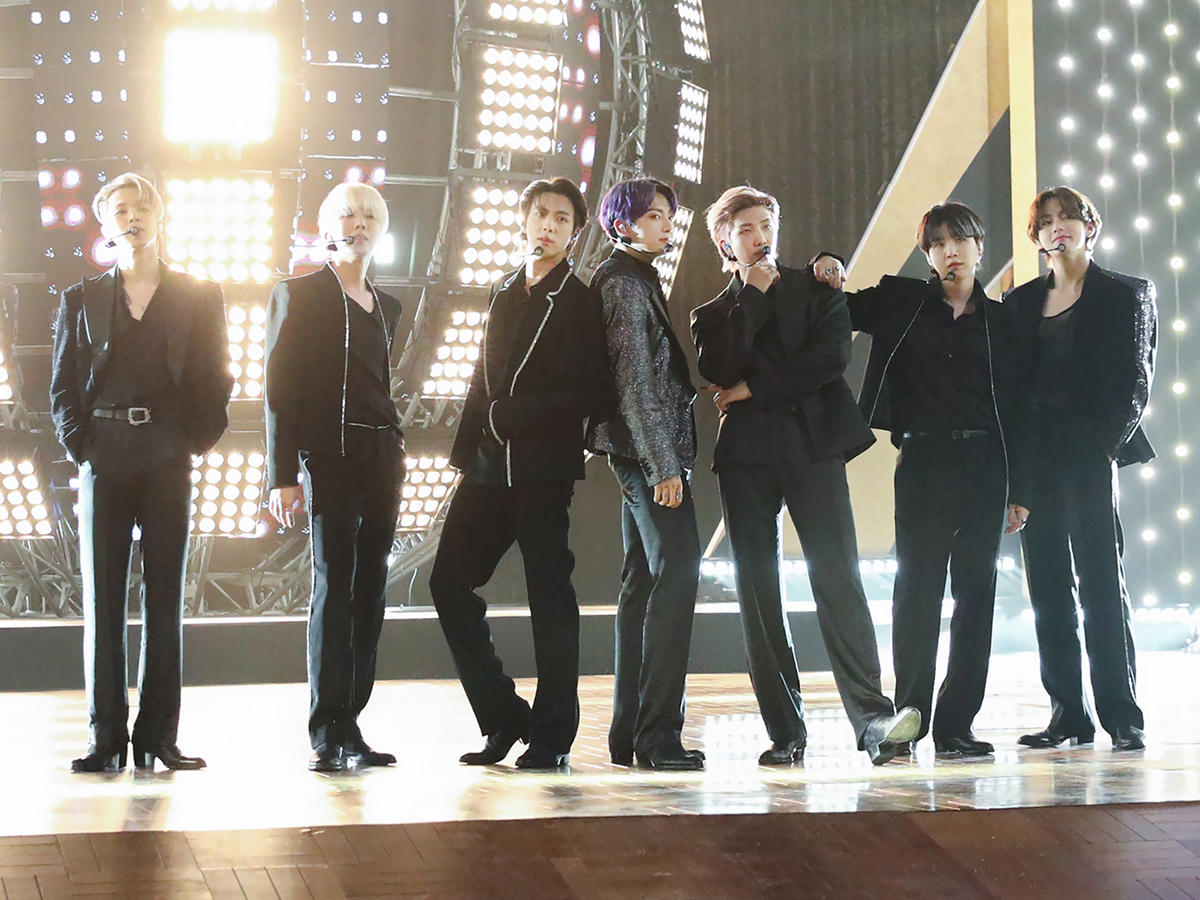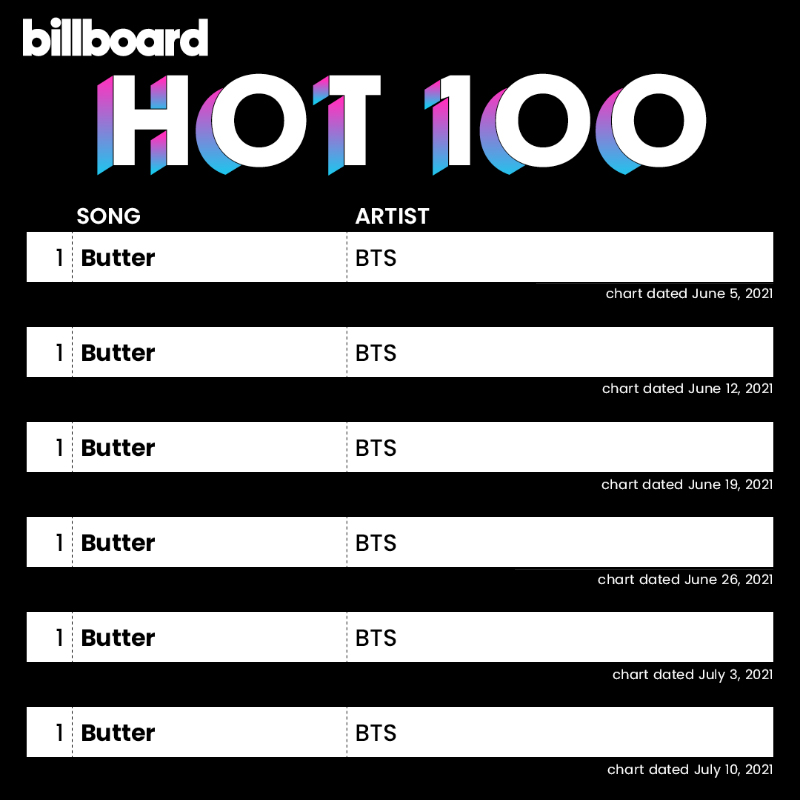
FEATURE
What BTS achieved in the US
Bigger, Hotter, Butter! in the USA
2021.07.12
BTS’s “Butter” topped the Billboard Hot 100 chart again on July 3, marking its sixth consecutive week at the top. So, what does this mean? “Butter” is the group’s third number one on the Hot 100 after “Dynamite” and “Life Goes On,” and they’re the only group to have ever debuted multiple songs at number one. Including “Savage Love (Laxed – Siren Beat),” which they did together with Jason Derulo and Jawsh 685, BTS has had four different songs reach number one on the Billboard chart within a span of nine months. Seven groups have earned their first four number ones on the chart in under a year, with the Beatles doing it in four months, the Supremes taking seven months and one week, Justin Timberlake making it in seven months and two weeks, and the Jackson 5 in eight months and two weeks; BTS is next on that list. They were also the fastest to achieve the feat since Timberlake did in 2007. From “Dynamite” to “Butter,” BTS is experiencing a record-breaking moment in the American popular music industry.
-
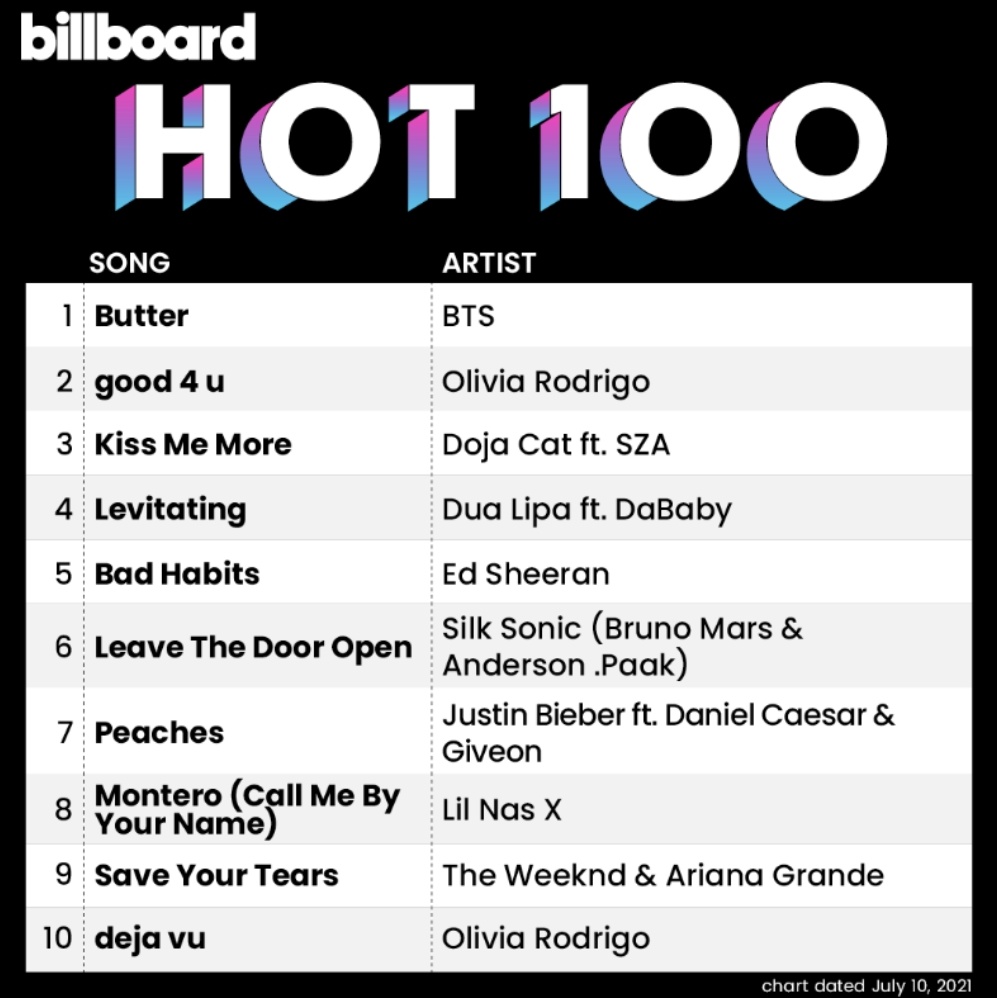 ©️ Billboard
©️ Billboard
In conjunction with the announcement of “Butter,” McDonald’s put the BTS Meal on sale in 49 countries across the globe, a collaboration that symbolizes BTS’s position in the global pop music industry; the band is so influential worldwide that even McDonald’s, whom Forbes counted among the world’s top 10 brands in 2020, collaborated with them. And then there’s ARMY, BTS’s fervent fandom, who ensure the band’s McDonald’s meal is sold out every day and post photos of their purchases to the Internet. The fanbase is also the reason “Butter” could top the Billboard Hot 100 for six weeks in the US: In the first week of its release, “Dynamite” ranked first in sales volume with 300,000 points, which included downloads as well as limited-edition vinyl and cassette versions, and represented the highest sales volume at any time of any artist in the past three years. In the same time frame, “Butter,” which was released exclusively as a digital single, racked up 243,000 downloads, putting it in the top spot for the week; the physical CD, which includes the new single “Permission to Dance,” is now available for purchase. In the streaming era, music downloads and physical album sales generally signify the size and level of passion of an artist’s fanbase. In BTS’s case, however, their radio and streaming performance, which reflect the reaction of the public at large, increased as well. It’s worth pointing out the remarkable growth the group made in the time between “Dynamite” and “Butter” as well. Within a week of its release, “Dynamite” saw 11.6 million radio audience impressions, while “Butter” had 18.1 million, with an audience of 2.83 million by its sixth week—an increase of 56% from the first week. On Spotify, the most popular music streaming service, “Butter” had 9.37 million streams in its first week, performing approximately 10% better than “Dynamite,” which was streamed 8.54 million times in a similar period.
According to Lee Hye Jin, leader of BIGHIT MUSIC marketing team, “Thanks to ARMY, the US has begun to discover a trend that has long existed in the Korean music market,” calling attention to the significance of “Butter” spending six consecutive weeks at number one on the Billboard chart. One proven method of success in the popular music industry is for artists to perform well on the charts based on their strong fanbases. But having a fanbase that’s enormous enough to influence the top position on the Billboard Hot 100—and then, taking this a step further, having enough influence on the public to keep a follow-up song at number one for six weeks straight—is something different altogether. Having grabbed the title of Hot 100 number one, “Dynamite” became a channel through which BTS could reach a public who didn’t know about them, and as some people among those outside the fanbase who had encountered “Dynamite” listened to BTS again because of “Butter,” the band became known to an even greater number people. According to the available data, some of them become ARMY, too. The intention is neither to cater to the existing fandom exclusively, nor the response of the wider public alone, but both. You could call it a kind of accumulation: BTS is simultaneously increasing the size of ARMY and increasing public awareness.
BTS’s success in the US pop music market also concisely illustrates the publicity they have generated around the world. The group began to gain recognition in the US in earnest in late 2015 when their music video for “DOPE” exploded onto the scene. In September of that year, around the peak of the YouTube reaction video trend in the US, well-known channel REACT uploaded a reaction video to BTS’s “DOPE” music video as a part of their K-pop series. The video soon started to spread by word of mouth. The comments left on the video make it clear that it instantly increased awareness of and interest in BTS among people who were unfamiliar with the band or K-pop in general. In the US, Google searches for “BTS” practically doubled in the period between September and December of 2015. ARMY responded enthusiastically to each and every reaction video as YouTubers raced to put out their own reaction videos for “DOPE.” At the time, ARMY was not as influential in the K-pop market as they are now. However, ARMY’s spirited reaction was well received on YouTube, which had been more open to K-pop than traditional media, creating even more fans in the process. BTS and ARMY’s journey together from the band’s debut song “No More Dream” all the way to “Butter” today is this same process realized on a larger, more zealous scale. The fanbase, concentrated around social media, learned how to focus that energy and emerge as a presence in the public eye, gradually widening its sphere of influence through more forms of media.
According to Lee Hye Jin, leader of BIGHIT MUSIC marketing team, “Thanks to ARMY, the US has begun to discover a trend that has long existed in the Korean music market,” calling attention to the significance of “Butter” spending six consecutive weeks at number one on the Billboard chart. One proven method of success in the popular music industry is for artists to perform well on the charts based on their strong fanbases. But having a fanbase that’s enormous enough to influence the top position on the Billboard Hot 100—and then, taking this a step further, having enough influence on the public to keep a follow-up song at number one for six weeks straight—is something different altogether. Having grabbed the title of Hot 100 number one, “Dynamite” became a channel through which BTS could reach a public who didn’t know about them, and as some people among those outside the fanbase who had encountered “Dynamite” listened to BTS again because of “Butter,” the band became known to an even greater number people. According to the available data, some of them become ARMY, too. The intention is neither to cater to the existing fandom exclusively, nor the response of the wider public alone, but both. You could call it a kind of accumulation: BTS is simultaneously increasing the size of ARMY and increasing public awareness.
BTS’s success in the US pop music market also concisely illustrates the publicity they have generated around the world. The group began to gain recognition in the US in earnest in late 2015 when their music video for “DOPE” exploded onto the scene. In September of that year, around the peak of the YouTube reaction video trend in the US, well-known channel REACT uploaded a reaction video to BTS’s “DOPE” music video as a part of their K-pop series. The video soon started to spread by word of mouth. The comments left on the video make it clear that it instantly increased awareness of and interest in BTS among people who were unfamiliar with the band or K-pop in general. In the US, Google searches for “BTS” practically doubled in the period between September and December of 2015. ARMY responded enthusiastically to each and every reaction video as YouTubers raced to put out their own reaction videos for “DOPE.” At the time, ARMY was not as influential in the K-pop market as they are now. However, ARMY’s spirited reaction was well received on YouTube, which had been more open to K-pop than traditional media, creating even more fans in the process. BTS and ARMY’s journey together from the band’s debut song “No More Dream” all the way to “Butter” today is this same process realized on a larger, more zealous scale. The fanbase, concentrated around social media, learned how to focus that energy and emerge as a presence in the public eye, gradually widening its sphere of influence through more forms of media.
Kim Dong Joon, president of HYBE 360, says “the artists have grown step by step in the US, starting with small concert halls, working their way up through arenas and into stadiums, just like they did in Korea.” BTS first cracked the Billboard 200 chart when it landed 2015’s The Most Beautiful Moment in Life, Pt. 2 at 171st place, rising soon after to 102nd with The Most Beautiful Moment in Life: Young Forever, and later reaching 26th with WINGS, then the highest among all K-pop artists. According to Kim, “Judging by this kind of reaction, we decided that, starting with the 2017 WINGS tour, we could upgrade to the arena level.” And indeed, BTS sold out six arena performances in the US that spring. The worldwide ARMY, including in the States, wasn’t made by any one person, nor did it start out with many members. ARMY has steadily increased in size since BTS first announced their debut at a small venue with no more than 600 people, just as interest and popularity from outside the fandom have grown along with it.
BTS didn’t sign with a famous American label when it entered the US. “I received calls from many interested famous US labels around 2017,” Yoon Seok Jun, CEO of HYBE AMERICA, explained. “But in the end, we decided not to sign any contracts. We had doubts about the approach to long-term local promotions within the systems of these giant labels while receiving PR and marketing support from them.” Instead, BTS continued to approach things the way they always had in Korea with their fanbase, and chose to keep growing alongside their fans. BTS got their chance to attend the Billboard Music Awards for the first time in 2017 when they were nominated for Top Social Artist. Instead of the conventional promotional formula, it was BTS’s ability to build a fanbase that actively communicates with them through social media, and who spread the word about the group, that brought them to the BBMAs.
BTS didn’t sign with a famous American label when it entered the US. “I received calls from many interested famous US labels around 2017,” Yoon Seok Jun, CEO of HYBE AMERICA, explained. “But in the end, we decided not to sign any contracts. We had doubts about the approach to long-term local promotions within the systems of these giant labels while receiving PR and marketing support from them.” Instead, BTS continued to approach things the way they always had in Korea with their fanbase, and chose to keep growing alongside their fans. BTS got their chance to attend the Billboard Music Awards for the first time in 2017 when they were nominated for Top Social Artist. Instead of the conventional promotional formula, it was BTS’s ability to build a fanbase that actively communicates with them through social media, and who spread the word about the group, that brought them to the BBMAs.
Even more people became aware of BTS through the performance videos that ARMY upvoted. After attending the 2017 BBMAs and the American Music Awards, the band made their first appearances on NBC’s The Ellen DeGeneres Show, ABC’s Jimmy Kimmel Live! and CBS’ The Late Late Show in November of that year. The fandom’s enthusiastic response attracts the attention of not only the mainstream awards ceremonies but also TV programs, with yet more people responding to the band in turn. Popular US artists typically make good use of major media while promoting, but only BTS pulls in a public response through the major media outlets while simultaneously reflecting certain aspects of themselves that makes the fans go wild. According to the BIGHIT MUSIC Global Communications team, they arranged the “Fortnight Dance Challenge” video in 2018—the most-viewed BTS-related video on NBC’s official Tonight Show YouTube channel after their performance videos—after they “first pitched it to the producers as something we believed the band members and ARMY would enjoy that would also fit in with the program’s atmosphere.” It was the result of an attempt to “put on a show in BTS’s signature style where BTS can shine” within the US media, “rather than to fit the existing mold,” and to “show to the masses why BTS are loved by so many people by exposing their natural magnetism.”
BTS member Jin drew significant attention from viewers as the “third one from the left” when the group made their first appearance on the BBMAs red carpet, which then quickly spread across social media. Billboard even selected it as their meme of the year. Two years later, in April of 2019, BTS went on NBC’s Saturday Night Live to perform their new song “Boy With Luv” along with “MIC Drop.” The response to their performances led to a meteoric rise in Google searches for “BTS.” The volume of searches for the group immediately after the SNL “Boy With Love” performance was the highest it’s been since. The HYBE Global Communications team said the band’s “appearance on SNL, which we had pitched for a really long time, was a historic moment of BTS breaking through the barrier of the US mainstream,” and explained that the view of BTS in the States has been different ever since. “There was a phase where we always had to pitch rigorously to the programs we wanted to promote on in order for them to understand the artists’ music, message and culture,” the team said, but that they can feel how now “people in the industry give their trust and respect to BTS as capable musicians.” When the artists appeared at the 2017 BBMAs, Americans saw them as the main characters in a new phenomenon, with ARMY as their main push; starting from their appearance on SNL, BTS secured their place as artists with enough credibility to their names that they could expect to see their popularity continue. If it was the fanbase who brought BTS to the US and the label who found a way to promote them that would amplify the response, it was the band members themselves who drew more and more people to love them ever more fervently at every crucial turn along the way, from the red carpet to the stage.
Lee, the marketing leader, notes how the popularity of “Dynamite” in the US eventually had an effect in other countries as well, pointing to “a phenomenon where people who didn’t even listen to BTS songs or have an interest in K-pop before stumbled upon numerous performances like on NPR’s Tiny Desk and MTV Unplugged via YouTube.” BTS’s Tiny Desk concert from September 2020 has 37 million views, 10 million more than their SNL video. And the number of subscribers to the group’s YouTube channel, BANGTANTV, which sat at roughly 34.89 million the day “Dynamite” was released, was up to 53 million as of July 4 this year. It seems like the logical outcome: The artists consistently put out good music while also maintaining a close emotional relationship with their fans and show off their best side whenever they have the chance. But some parts aren’t so obvious. The popularity of K-pop, BTS included, has always ultimately been the result of passionate fans. But one question consistently failed to have an answer: Where do passionate fans come from—especially fans of a group whose debut went unnoticed even in Korea, the same group who had a number-one hit on the Billboard Hot 100 for six consecutive weeks in the US—a place with a completely different language and environment? But the answer was always there, right in front of us. It’s no exaggeration to say that BTS, their label and the fandom all worked together to make that answer clear. But instead of seeing the answer, people kept asking the same question—because it’s K-pop. Because they’re a boy band. Or because it’s BTS.
Article. Yejin Lee
Photo Credit. Billboard
Copyright © Weverse Magazine. All rights reserved.
Unauthorized reproduction and distribution prohibited.
Unauthorized reproduction and distribution prohibited.
Read More
- When the Walls Fell2020.10.19
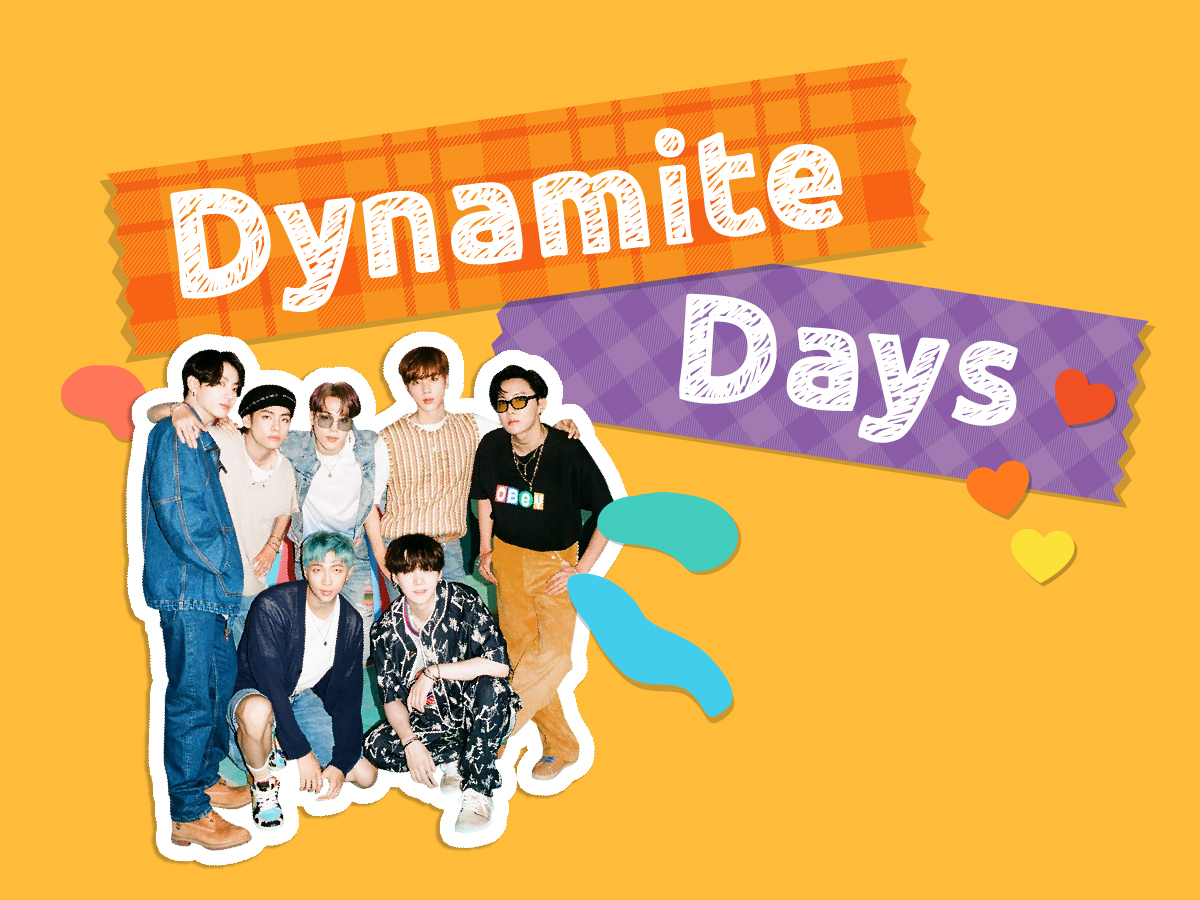
- BTS and the Grammys: Why now?2020.11.16
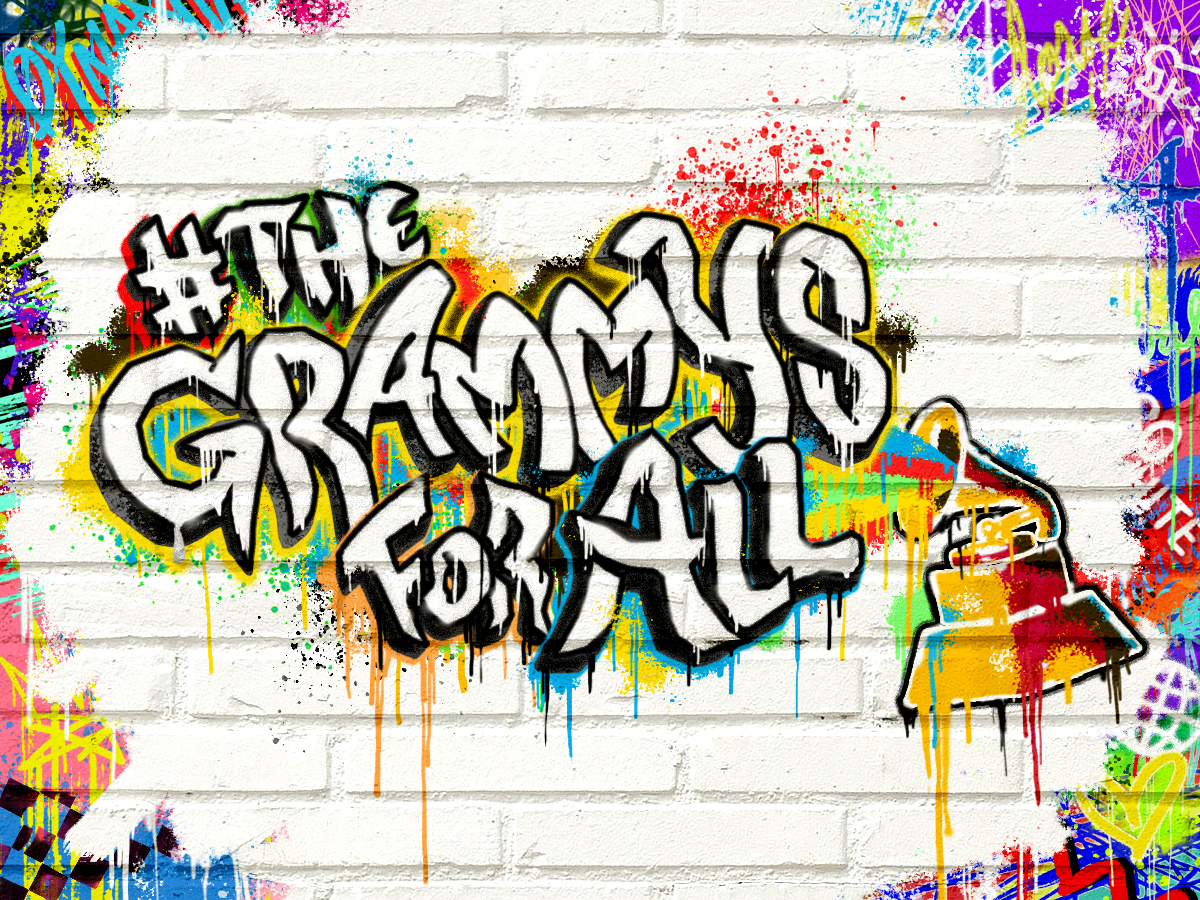
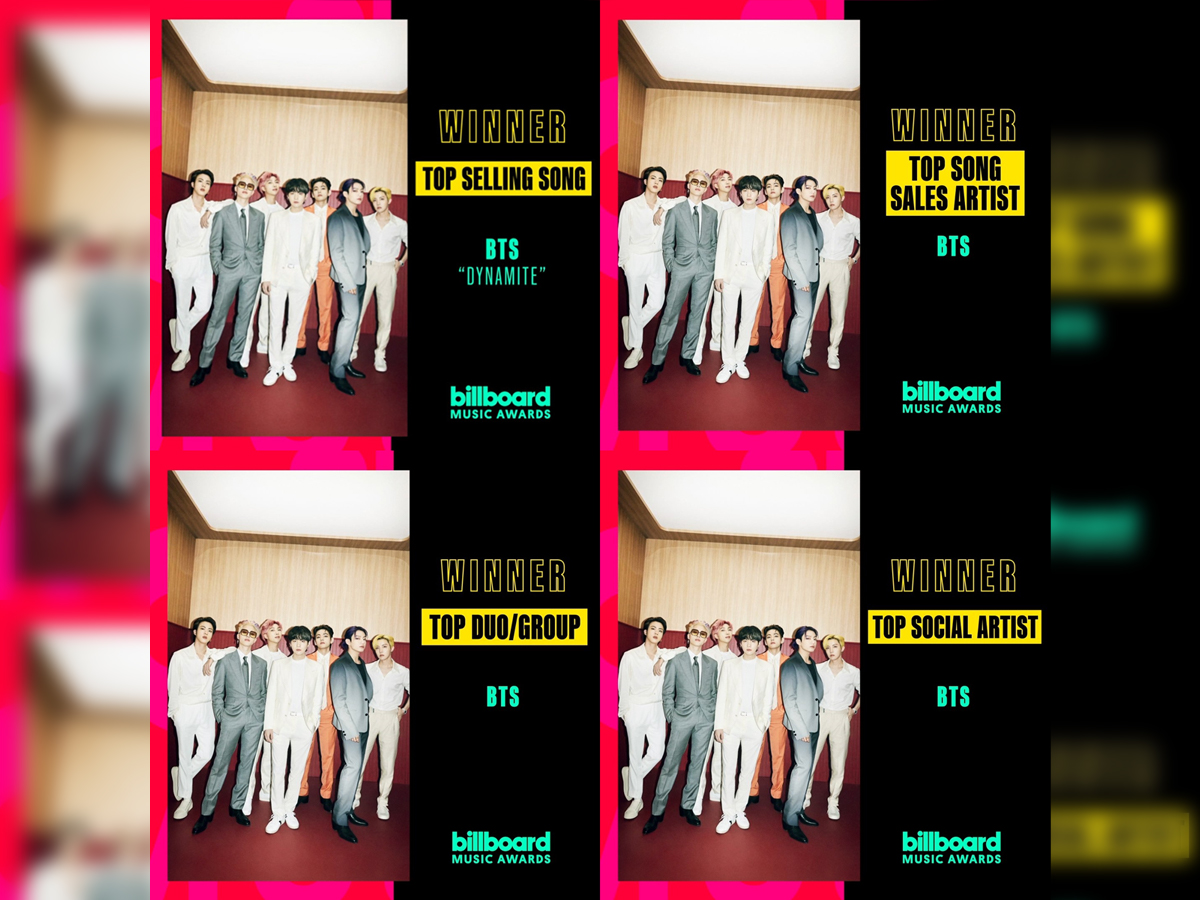
- Talking Music with “Butter”2021.05.26
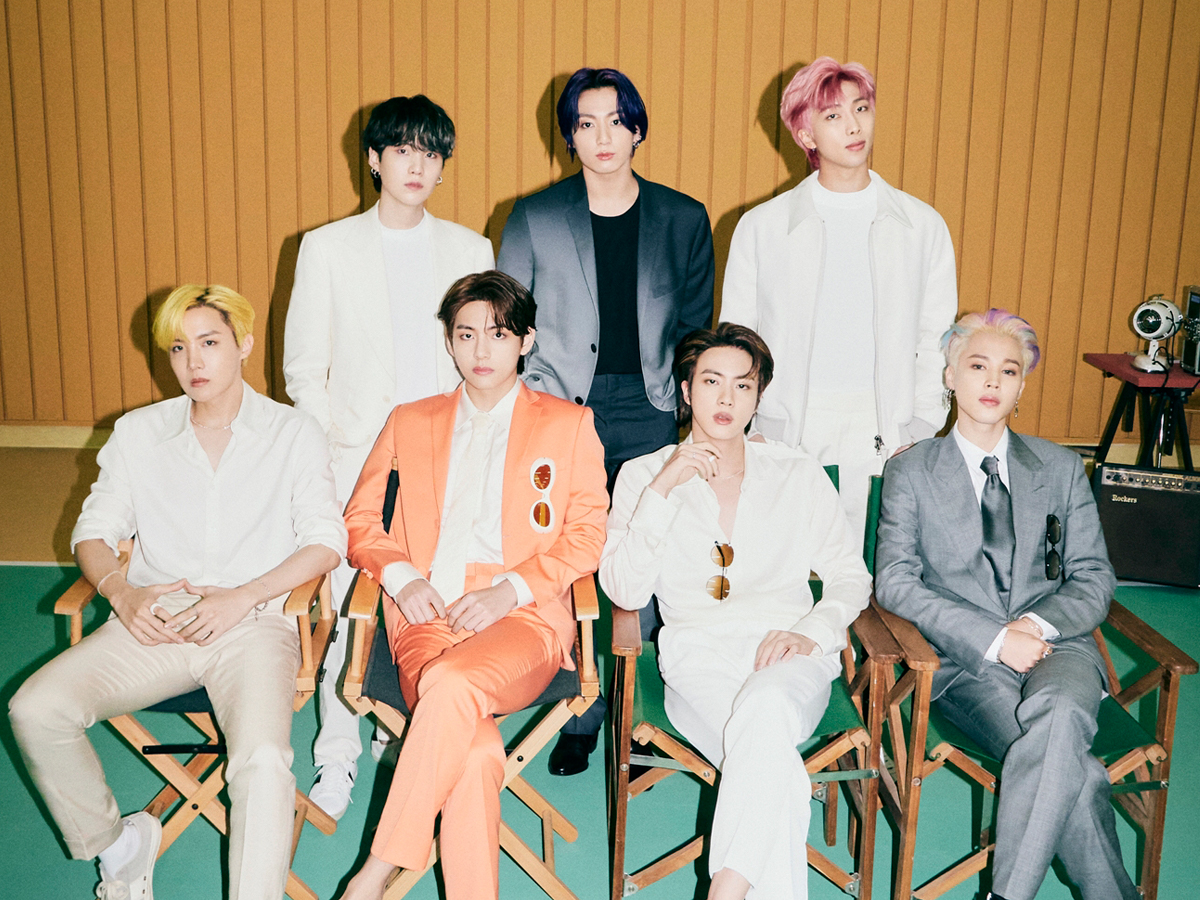
- This is BTS-pop!2021.05.27
